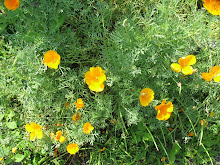
Fall--a time for birthday parties, open studios, apple picking, the Roslindale Parade, etc. and after shivering for a few hours in the fall chill, lounging on the couch under a blanket, coffee and Sunday paper within reach, checking the foliage status of the maple across the street...gardening is over, right? Of course not.
But like the cleanup at the end of a party, it must be done. I guess that would really happen in November, so October is like that period where you start shutting off the music and yawning in front of your guests, telling how great it was to see them, and making sure everyone has a ride home.
October is one of the busiest months of the year, especially when it comes to the planting of trees, shrubs, and bulbs, as well as dividing and transplanting perennials, composting, and protecting some plants from the winter elements. With the exception of a raspberry plant I brought home from the Perennial Divide, most of my transplanting involves moving around a few perennials at home.
In my Minton Stable plot, I'll keep my lettuce and carrots watered, cut back spent perennials, and pull out and compost the tomato plants. I'll try to get around to harvesting the basil before it's too late; most of it's out already. I'll keep the zinnias blooming and, as much as I know there won't be a harvest, I can't bring myself to pull out the peppers and eggplant until next month. According to the community garden rules, the plots must be cleaned out by November 30, so I have time. If I lived a little farther north, in Zone 7, covering the strawberries would be a good idea. I did nothing to protect them last year and they still proliferated.
I'll think about a winter cover plant that would enhance the soil, such as winter rye, which my husband swears by but is hard to find. I'd be curious to know what other gardeners are planting.
Okay, it's Monday, the sun is out, so it's time to stop procrastinating.


4 comments:
I think I'll be in clover for the winter.
Nearly every year that I have gardened, I have intended to plant a cover crop, such as annual rye, for the winter, but I think that in some thirty years of gardening I never have got around to doing it.
I have never gotten around to doing it either! But I think this year I will have the time.
I'm intrigued by the idea of using clover instead of rye. One comparison I've found indicates that clover is less invasive and may be a better choice for planting around perennials (http://knorq.wordpress.com/2008/03/16/results-over-winter-ground-cover-rye-grass-vs-crimson-clover/).
So we'll see! Thanks for the comments.
One advantage of clover would be that it is a legume and adds nitrogen to the soil. I think that vetch is another possibility in the legume family.
Post a Comment